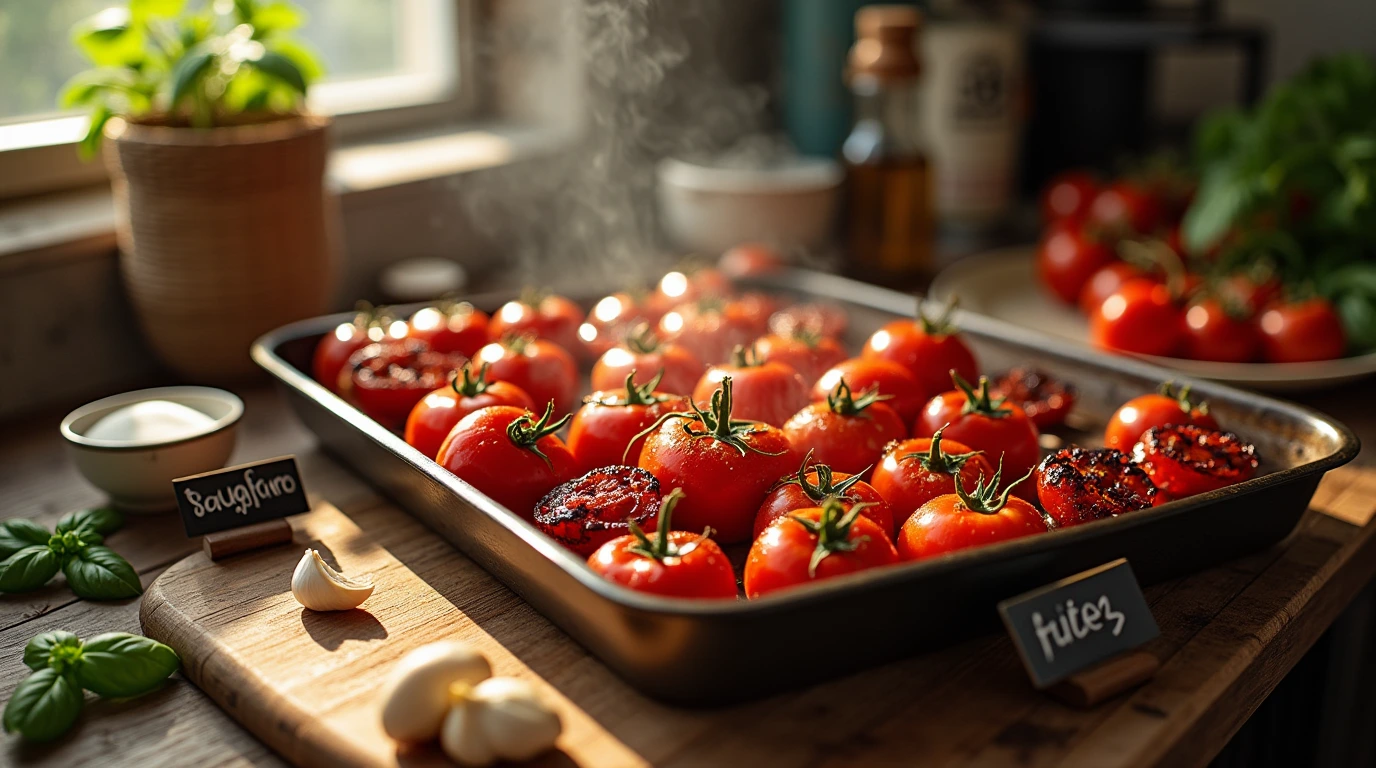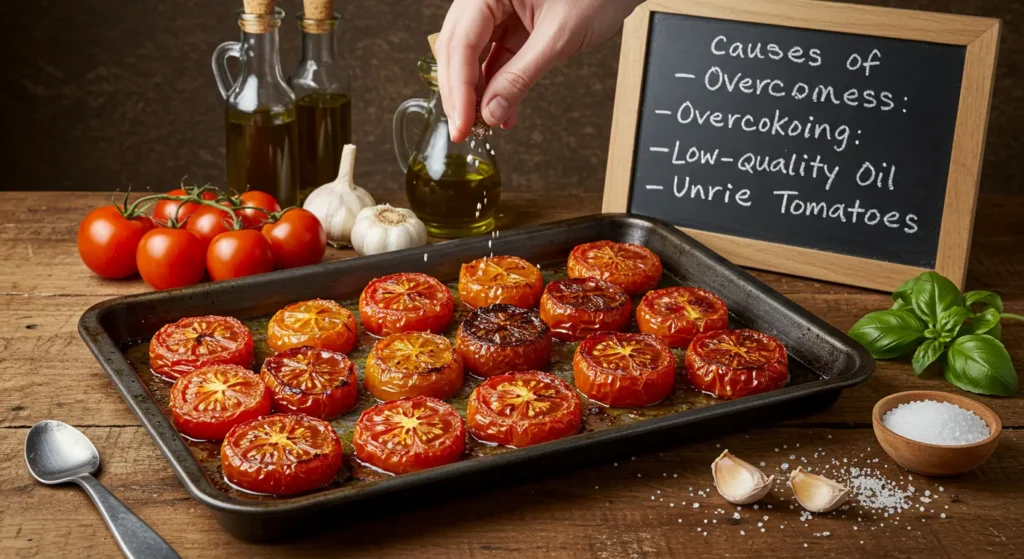Roasted tomatoes are a delicious way to enhance the natural sweetness and depth of this versatile fruit. However, if you’ve ever wondered, “Why do my roasted tomatoes taste bitter?”, you’re not alone. Bitterness can result from overcooking, poor ingredient choices, or unbalanced seasoning.
In this article, we’ll explore the common causes of bitter roasted tomatoes and offer practical solutions to prevent and fix this issue. With the right techniques, you can enjoy perfectly roasted tomatoes every time, packed with flavor and free of bitterness.
Common Reasons Roasted Tomatoes Taste Bitter
Several factors can cause roasted tomatoes to develop an unpleasant bitter flavor. Identifying the root cause will help you avoid this issue in the future.
1. Overcooking or Burning the Tomatoes
- Why It Happens:
- Roasting tomatoes at too high a temperature or for too long can cause the natural sugars to burn, leading to bitterness. The charred skins or overly caramelized juices contribute to the unpleasant taste.
- How to Prevent It:
- Roast at a moderate temperature (around 375°F-400°F) and check on the tomatoes periodically. Look for a soft, slightly caramelized texture, not burnt edges.
2. Using Unripe or Low-Quality Tomatoes
- Why It Happens:
- Unripe tomatoes lack natural sweetness and have a higher concentration of acidic compounds, making them more likely to taste bitter when roasted. Similarly, low-quality or out-of-season tomatoes may not have the flavor depth needed for roasting.
- How to Prevent It:
- Use ripe, high-quality tomatoes such as Roma, cherry, or vine-ripened varieties. They are naturally sweeter and hold up well during roasting.
3. Excessive Use of Bitter Ingredients
- Why It Happens:
- Certain ingredients like extra virgin olive oil, garlic, or herbs can become bitter when exposed to high heat for too long.
- How to Prevent It:
- Add these ingredients midway through roasting or after removing the tomatoes from the oven to maintain their flavor.
4. Lack of Proper Seasoning
- Why It Happens:
- Without the right balance of salt, sugar, or herbs, the natural acidity of tomatoes can dominate, resulting in a bitter taste.
- How to Prevent It:
- Season the tomatoes with a sprinkle of salt and a pinch of sugar before roasting. This enhances their natural sweetness and reduces bitterness.
How to Prevent Roasted Tomatoes Taste Bitter
Preventing bitterness in roasted tomatoes starts with the right ingredients, proper technique, and balanced seasoning. Follow these tips for perfectly roasted tomatoes every time.

1. Choose the Right Type of Tomatoes
- Best Choices: Use naturally sweet varieties like cherry tomatoes, grape tomatoes, or vine-ripened Roma tomatoes. These types hold their shape well and develop a rich, sweet flavor when roasted.
- Avoid Unripe Tomatoes: Select tomatoes that are fully ripe, as they contain more natural sugars to balance acidity.
2. Use Balanced Seasonings
- Add Salt and Sugar: Sprinkle a light layer of salt and a small pinch of sugar on the tomatoes before roasting. This combination enhances natural sweetness and neutralizes acidity.
- Incorporate Herbs: Add fresh or dried herbs like thyme, oregano, or basil for depth of flavor. To avoid bitterness, sprinkle fresh herbs after roasting.
3. Control the Roasting Temperature
- Temperature Range: Roast tomatoes at 375°F-400°F for an even caramelization without burning.
- Monitor Cooking Time: Roast for 20-30 minutes, depending on the size of the tomatoes. Check for softness and light caramelization, avoiding charred edges.
4. Add a Sweet Element for Balance
- Drizzle Honey or Balsamic Glaze: A touch of honey or balsamic glaze enhances the natural sweetness of the tomatoes and counteracts bitterness.
- Use Sweet Vegetables: Roast tomatoes alongside carrots, bell peppers, or onions to infuse the dish with natural sweetness.
5. Use High-Quality Olive Oil
- Choose the Right Olive Oil: Use a mild, high-quality olive oil to avoid bitter flavors. Extra virgin olive oil can become bitter if overheated, so consider using it as a finishing drizzle instead of during roasting.
Pro Tip: Rotate the Tomatoes During Roasting
Turn the tomatoes halfway through cooking to ensure even caramelization and prevent any one side from burning.
Part 4: How to Fix Roasted Tomatoes Taste Bitter After Cooking
If your roasted tomatoes taste bitter, don’t worry—you can salvage them with a few simple fixes to balance the flavors and enhance their sweetness.

1. Add a Touch of Sweetness
- Honey or Maple Syrup: Drizzle a small amount over the tomatoes to counteract bitterness without overpowering their natural flavor.
- Sugar: Sprinkle a pinch of granulated sugar and toss the tomatoes to distribute it evenly.
- Balsamic Glaze: Add a drizzle of balsamic glaze for a sweet and tangy contrast.
2. Incorporate Creamy or Fatty Elements
- Cheese: Mix the roasted tomatoes with creamy cheeses like goat cheese, ricotta, or mozzarella to mellow the bitterness.
- Butter or Cream: Stir in a pat of butter or a splash of heavy cream if you’re using the roasted tomatoes in a sauce or soup.
- Avocado: Pair the tomatoes with avocado slices for a creamy balance in salads or sandwiches.
3. Balance with Acid or Herbs
- Fresh Herbs: Add fresh basil, parsley, or cilantro after roasting to brighten the flavor and mask bitterness.
- Lemon Juice or Vinegar: A small squeeze of fresh lemon juice or a splash of white wine vinegar can cut through bitterness while enhancing the overall flavor.
4. Blend into a Sauce
- Puree the Tomatoes: Blend the roasted tomatoes into a smooth sauce and add spices, cream, or stock to adjust the flavor.
- Combine with Other Ingredients: Mix the tomatoes with sweet vegetables like roasted bell peppers or caramelized onions for a flavorful pasta sauce or dip.
5. Use Them in a Dish with Bold Flavors
- Pasta: Toss the roasted tomatoes with pasta, olive oil, garlic, and Parmesan cheese to balance their flavor.
- Pizza Topping: Pair them with salty toppings like olives, feta, or prosciutto for a delicious contrast.
- Stews or Soups: Incorporate the tomatoes into soups or stews with robust seasonings like cumin, smoked paprika, or chili flakes.
Why Fixing Bitterness Matters
Balancing the flavors of your roasted tomatoes ensures they enhance your dishes rather than overpower them. With these quick adjustments, you can turn a bitter batch of roasted tomatoes into a rich, flavorful component for your meals.
FAQs About Roasted Tomatoes Taste Bitter
Here are answers to some commonly asked questions about roasting tomatoes, helping you perfect your technique and avoid bitterness.
1. What Temperature is Best for Roasting Tomatoes?
- Optimal Temperature: Roast tomatoes at 375°F-400°F. This range allows the natural sugars to caramelize without burning the tomatoes.
- Larger Tomatoes: If roasting larger tomatoes like Romas, opt for the lower end of the range to ensure even cooking.
- Cherry or Grape Tomatoes: These smaller varieties roast well at higher temperatures, around 400°F, for a slightly charred, sweet result.
2. Can I Use Canned Tomatoes for Roasting?
Yes, you can roast canned tomatoes, but the texture and flavor will differ slightly from fresh ones.
- How to Roast Canned Tomatoes:
- Drain the canned tomatoes well and spread them on a baking sheet.
- Season with olive oil, salt, and pepper. Roast at 375°F until they caramelize slightly.
- Best Use: Roasted canned tomatoes work well in sauces, soups, and stews where texture is less critical.
3. How Do I Store Roasted Tomatoes?
Proper storage ensures your roasted tomatoes stay fresh and flavorful:
- In the Refrigerator:
- Store roasted tomatoes in an airtight container for up to 5 days.
- Add a thin layer of olive oil to keep them moist and enhance their flavor.
- In the Freezer:
- Place roasted tomatoes in a freezer-safe container or bag, removing as much air as possible.
- Freeze for up to 3 months. Thaw overnight in the refrigerator before using.
4. Can I Roast Tomatoes Without Oil?
Yes, but the texture and flavor will differ:
- How to Do It: Use parchment paper to prevent sticking and roast at a slightly lower temperature to avoid drying out the tomatoes.
- Best Use: Oil-free roasted tomatoes are great for blending into soups or sauces where additional moisture is added later.
5. Why Do My Roasted Tomatoes Stick to the Pan?
Sticking can occur if the baking sheet isn’t properly prepared:
- How to Prevent It:
- Line your baking sheet with parchment paper or a silicone baking mat.
- Lightly coat the tomatoes with oil to create a protective barrier.
Conclusion: Perfectly Roasted Tomatoes Every Time
Roasted tomatoes are a versatile and flavorful addition to countless dishes, but bitterness can sometimes detract from their natural sweetness. By understanding why your roasted tomatoes taste bitter and applying the tips in this guide, you can consistently achieve perfectly balanced, caramelized tomatoes every time.
Key Takeaways:
- Prevent Bitterness: Choose ripe tomatoes, roast at the proper temperature, and balance the seasoning with salt and a touch of sugar.
- Fix Bitterness: Add sweetness, creamy elements, or fresh herbs to adjust the flavor of roasted tomatoes after cooking.
- Experiment with Recipes: Use your perfectly roasted tomatoes in salads, sauces, pasta dishes, and as pizza toppings to elevate your meals.
For more inspiration, explore our loaded baked potato soup recipe or check out our complete guide to roasted vegetables to enhance your cooking skills further.



